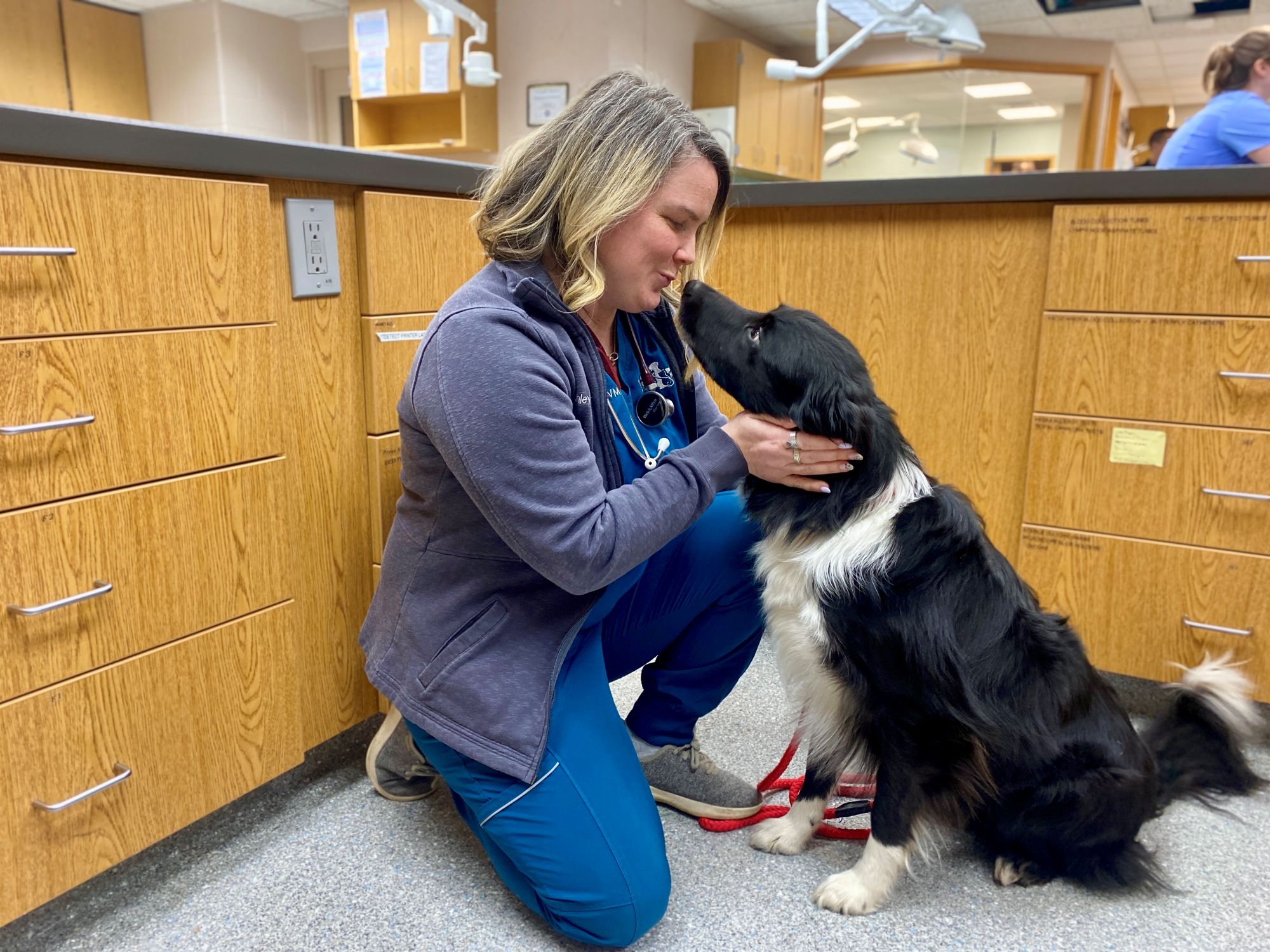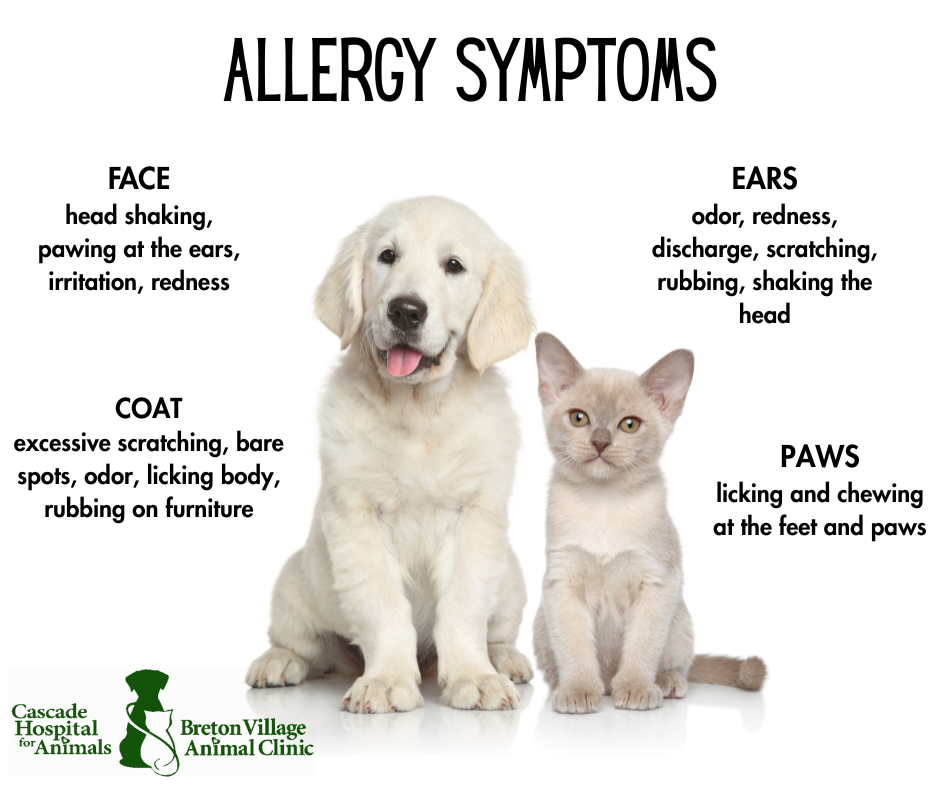
Understanding and Treating Allergies in Dogs and Cats
As pet owners, we cherish the happy wags and playful purrs our companions bring into our lives. However, when that joy is interrupted by constant scratching, licking, or head shaking, it can be concerning. Allergies are a common culprit behind these uncomfortable symptoms in both dogs and cats. At Cascade Hospitals for Animals (CHFA), we understand how frustrating pet allergies can be, and we're here to help.
Dr. Ashley Solnik, a dedicated veterinarian at CHFA, offers valuable insights into pet allergies and how we can best manage them.
The Usual Suspects: Common Pet Allergies
So, what exactly are our pets reacting to? According to Dr. Solnik, "Dogs and cats can have several different types of allergies which we generally break into three categories including environmental allergies (grasses, trees, pollen, dust mites, etc), flea allergies or food allergies. Environmental allergies are by far the most common type of allergies that we see."
Just like us, our pets can be sensitive to a variety of environmental factors. Dr. Solnik notes, "Animals can have allergies to many of the same things people have allergies to in our general environment and this can lead us to noticing a seasonal pattern to some pets' allergies." While environmental allergies often fluctuate with the seasons, Dr. Solnik points out that "if a pet is itchy year round, we may be more suspicious of a food allergy or some sort of allergen inside the house that they are constantly exposed to."
Decoding the Signs: What to Watch For
How can you tell if your pet is suffering from allergies? Dr. Solnik explains that allergies can manifest in various ways, but the initial signs often involve intense itching. "Pets will commonly first show signs of being extremely itchy. They will scratch themselves excessively or lick and chew at their legs and paws, stomach or armpit regions to a point where they will create red and irritated skin and this generally leads to infection."

Beyond skin irritation, ear issues are another common indicator. "Many pets with allergies will also often show symptoms of ear infections which can be seen as a pet shaking their head excessively, pawing at their ears, red or irritated ear flaps or excessive debris coming out from the ear canals," Dr. Solnik advises.
The Importance of Early Intervention
Ignoring these symptoms isn't just leaving your pet in discomfort; it can lead to more serious health issues. "It is important not to ignore possible allergy symptoms because usually if we can intervene early enough we can very effectively stop the drive to scratch, lick and chew and hopefully prevent more severe disease and infection," emphasizes Dr. Solnik.
Untreated allergies can escalate quickly. "If we can intervene early we are generally looking at a course of an allergy medication but if allergies worsen and go untreated this can lead to other complications of severe skin or ear irritation and secondary infections. This then leads to more discomfort for the pet as well as having to administer more medications to treat the infection on top of the underlying allergies."
Our Approach to Treatment: Tailored Care
At CHFA, we believe in a personalized approach to managing pet allergies. Dr. Solnik outlines some of our go-to treatments: "We have two commonly used allergy medications that are often employed to help specifically target the allergy receptors and lessen itching/scratching behavior. The first option is a medication called Apoquel which is an oral medication given daily as needed for environmental allergies. The other is an injectable medication called Cytopoint that is labeled to give 4-6 weeks of itch relief in allergy dogs." For your convenience and to aid in the seamless management of your pet's allergies, CHFA also has an on-site pharmacy stocked with pet medications.
The choice between these medications often depends on the individual pet and owner. "Allergy medications can work differently in each animal, similar to humans, and what works for one dog may or may not work well for another. I will generally start with the oral medication Apoquel as most pets will tolerate taking a chewable medication just like a treat however, if an owner has concerns about medicating their pet or compliance of actually administering the medication may be an issue I may reach first for the injectable medication. Similarly, if the oral medication doesn't work well or vice versa, we may try the other medication to see if that pet responds to a different course of treatment."
For a more long-term solution, allergy immunotherapy is also an option. "Allergy immunotherapy is also available in the form of injections if allergy testing is performed. Environmental allergy testing is generally quite accurate and can give us a better idea of how to formulate the allergy serum specifically for each pet. Allergy immunotherapy is the only way to really try to modulate or change the immune system and truly lessen allergies. It can be very helpful in a large number of pets with allergies."
 When food allergies are suspected, a specific diagnostic approach is necessary. "If we suspect a pet has an underlying food allergy, the only way to know is to perform a diet trial. Food allergy blood or saliva testing is generally incredibly inaccurate and not advised to be performed. During a diet trial, pets are fed a hypoallergenic diet for a period of at least 12 weeks. Hypoallergenic foods are processed differently and the protein source, which is the most common ingredient that pets have allergies to, is broken down so the body doesn't recognize it and is less reactive to the source."
When food allergies are suspected, a specific diagnostic approach is necessary. "If we suspect a pet has an underlying food allergy, the only way to know is to perform a diet trial. Food allergy blood or saliva testing is generally incredibly inaccurate and not advised to be performed. During a diet trial, pets are fed a hypoallergenic diet for a period of at least 12 weeks. Hypoallergenic foods are processed differently and the protein source, which is the most common ingredient that pets have allergies to, is broken down so the body doesn't recognize it and is less reactive to the source."
Finally, year-round flea and tick prevention is crucial. "Lastly, I recommend all patients be on a monthly flea/tick preventative year round but I especially recommend this for pets we are suspecting of allergies as we can use this to very successfully manage the risk of a flea infestation thus severe allergies."
Debunking Common Misconceptions
Dr. Solnik also addressed some frequent misunderstandings about pet allergies. "The most common misconceptions about allergies that many owners bring up are commonly surrounding food allergies. Food allergies themselves are actually fairly rare but there are a certain number of patients that truly have them. Many owners will have concerns that their pet is allergic to the grain portion of the diet or has a corn sensitivity. It is actually most likely for a pet to have allergies to the protein source in the diet, generally chicken or beef." This highlights the importance of a proper diet trial to accurately identify food allergies.
Another common question involves over-the-counter human medications. "I also often get asked about using over the counter human allergy medications such as Benadryl or Zyrtec to help manage pet allergies. These medications are generally safe however have not been proven to be very effective in managing allergies in animals so these are generally not my recommendation for a first line of defense but can sometimes be helpful in combination with other allergy therapies to help with mild itching and scratching."
Partnering with Your Veterinarian: Your Best Resource
Navigating pet allergies can feel overwhelming, but you're not alone. Dr. Solnik's key advice for pet owners is to "work with your veterinarian. Allergies are challenging, they are frustrating for both pet owners and veterinary professionals and they can be very difficult to manage in some cases. Forming a good relationship with a veterinary professional can help guide owners in what diagnostics may be appropriate to help pinpoint their pets allergies or what specific medications may or may not be of benefit."
Dealing with pet allergies is often a long-term commitment. "Having a pet with potential allergies is a lifelong commitment as these pets are often prone to having flare ups or times where the allergy is difficult to control and your veterinarian is the best tool out there to help guide down that path to hopefully the best outcome for your pet."
If you've noticed your pet exhibiting any signs of allergies, don't hesitate to reach out to us at Cascade Hospitals for Animals. Our experienced team, including dedicated veterinarians like Dr. Solnik, is here to provide the expertise and compassionate care your animal needs to live a happy and comfortable life.



